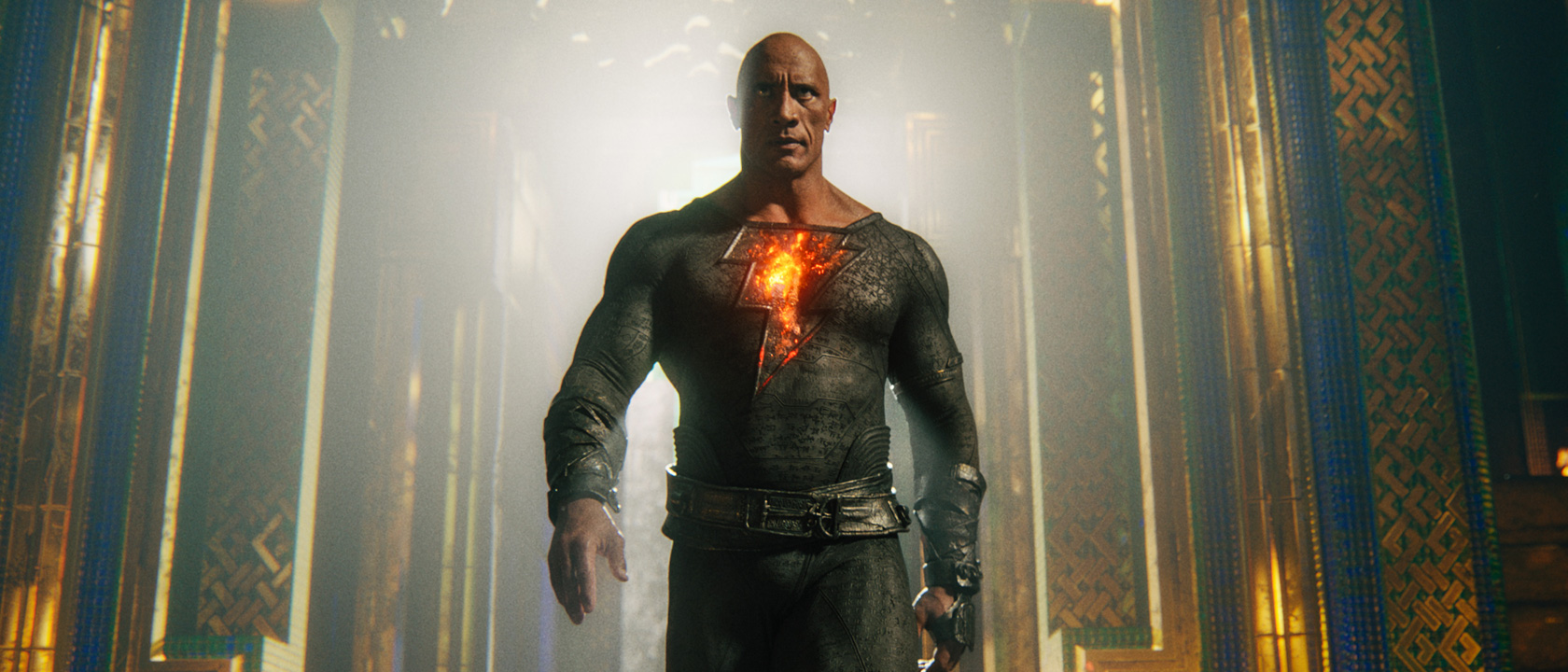In both good and bad ways, Jaume Collet-Serra’s Black Adam is indicative of the point we’ve reached in the ongoing golden age of superhero movies. Even putting aside the fact that it’s a major blockbuster about a character with relatively little pre-existing pop culture impact, the narrative plays out very much like the first arc in a brand new comic book series about the titular character – bringing the eponymous antihero into what legitimately feels like a familiar world and setting up a relatively contained conflict. There are high, world-ending stakes thrown in, but it’s not a globe-trotting adventure and it’s not a traditional, linear origin story.
Black Adam is occupying an interesting moment for the genre… but that doesn’t mean it all translates to a stellar cinematic experience. The project has some admirable qualities in broader contexts, but in and of itself, it struggles to stand out in a crowded genre, and it sports a plot that proves to be broken by the time the third act begins. There is a talented ensemble put together beyond Dwayne Johnson as the production’s anchor, and they each get special individual moments during the film’s runtime, but the movie also doesn’t seem to know what to do with the characters beyond the obvious. This ultimately undermines the unique approach to their arrival into the DC Extended Universe.
Set almost exclusively in the fictional Middle Eastern country of Kahndaq, Black Adam begins as Adrianna (Sarah Shahi), a rebel against the ruling Intergang cartel, surreptitiously searches for a powerful crown of legend that she wants to ensure doesn’t end up in the wrong hands. In doing so, she unfortunately ends up leading Intergang soldiers right to the relic, but she also discovers the tomb of legendary hero Teth-Adam (Dwayne Johnson). She recites an engraved phrase as her possible last words, and this unleashes him into the modern world.
Immediately aware of Teth-Adam’s resurgence and concerned about the threat he represents, Amanda Waller (Viola Davis) calls on the Justice Society to neutralize him. Carter Hall a.k.a. Hawkman (Aldis Hodge) takes the mission, teaming up with his mystical old friend Kent Nelson. a.k.a. Doctor Fate (Pierce Brosnan). and bringing along two newbies for the undertaking: the wind-manipulating Maxine Hunkel. a.k.a. Cyclone (Quintessa Swindell), and Al Rothstein, a.k.a. Atom Smasher (Noah Centineo), a legacy hero who has the ability to grow to immense size.
The four of them travel to confront Adam, and it turns out that it’s not just his incredible power set with which they have to contend. The long-entombed superhuman quickly gains a following from people of Kahndaq, who view him as a savior, including Adrianna’s young son (Bodhi Sabongui). Meanwhile, Intergang continues to pursue the dangerous crown that is in Adrianna’s possession.
Black Adam definitely tries some interesting things, but it’s unable to make them work.
Between the big screen introduction of the Justice Society and the origins of the titular character, Black Adam has a lot on its plate, and it actually takes a fascinating route to balance all of it. In regards to the superhero team, some may wonder if they missed a movie or TV series in the DCEU canon, as the blockbuster treats them as though they are an existing and established part of the continuity – letting audiences get to know them through the story developments and relationships. And in regards to Adam himself, the film delivers the legend surrounding the character first, and then examines the story and uncovers the truth.
Both of these approaches are smart and cool, but the execution ends up lacking.
The Justice Society is well-cast with an ensemble of charismatic stars, but the character development is shallow. Each member of the team has their individual power set and one (1) quirk/trait that they coast on from start to finish. I’d go as far as to say that they are entertaining, and there is chemistry in the relationships (both in romantic and friendship terms), but I’d be hard pressed to name a standout given that none of them are given particularly great material.
The Adam side of things is quite a bit stupider. If you’ve seen the Black Adam trailer that starts with the line, “My son sacrificed his life to save me,” then you’ve not only already been told what this blockbuster has to offer as its “big” second act twist, but you’ll be effectively confused in the first hour of the film as it fails to try and sell the “legendary” version of events. This is a bizarre issue that time will fortunately fix, but it’s an impactful factor in the experience going into its theatrical release. It’s never satisfying when you feel as though you are 10 steps ahead of the film you are watching, and that’s what this delivers.
The limited scope of Black Adam is special, but it ends up handcuffing the film.
Similar to its other issues, the scope and scale of Black Adam is a nice surprise, but big issues crop up as the narrative unfolds. Not counting the flashback sequences in 2600 BC, the events of the film transpire over the course of just a couple days and almost entirely in one city, and it’s a novel idea that doesn’t end up working. At first the problem is just the fact that the action scenes are repetitive with familiar players and environments (the barrage of CGI helps nothing), but things get far worse later in the movie. This spoiler-free forum prevents me from getting into details, but a third act development in the plot is rendered laughable when one reflects on how much time passes from the start of the story up to that point.
Black Adam is more mediocre than bad, but that’s perhaps worse in a pop culture landscape that will be quick to forget about it as audiences’ attentions drift to the next superhero blockbuster. Even Dwayne Johnson seems ready to move on, as the biggest hype he has generated for the release has been about it setting the table for the future. Given the number of years this project was in development, and how it was promoted to shift the balance of power in the DC Universe, it’s disappointing that the end result is so unremarkable.

Eric Eisenberg is the Assistant Managing Editor at CinemaBlend. After graduating Boston University and earning a bachelor’s degree in journalism, he took a part-time job as a staff writer for CinemaBlend, and after six months was offered the opportunity to move to Los Angeles and take on a newly created West Coast Editor position. Over a decade later, he's continuing to advance his interests and expertise. In addition to conducting filmmaker interviews and contributing to the news and feature content of the site, Eric also oversees the Movie Reviews section, writes the the weekend box office report (published Sundays), and is the site's resident Stephen King expert. He has two King-related columns.











